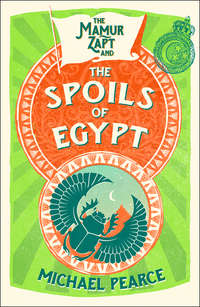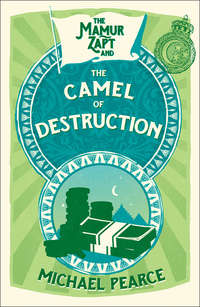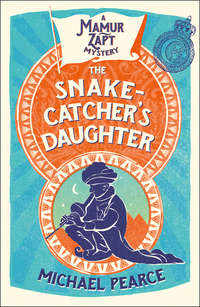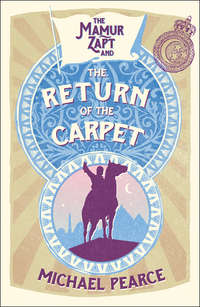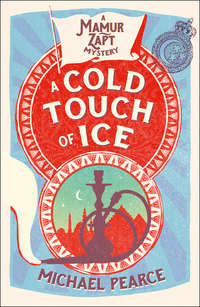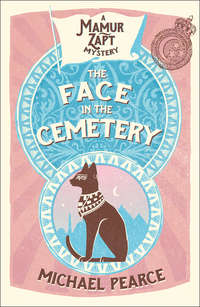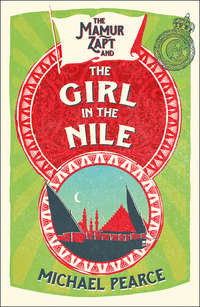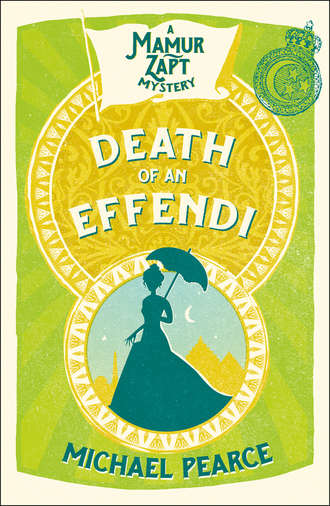
Полная версия
Death of an Effendi

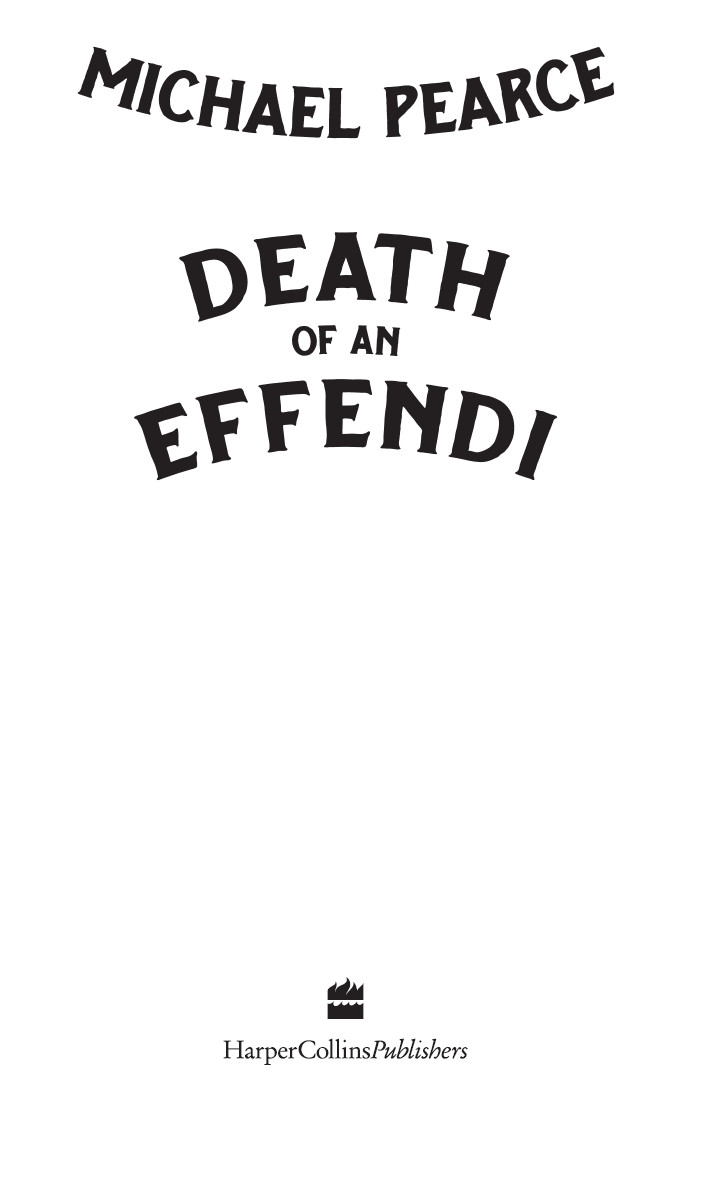

HarperCollinsPublishers Ltd. 1 London Bridge Street London SE1 9GF
www.harpercollins.co.uk
First published in Great Britain by HarperCollinsPublishers 1999
Copyright © Michael Pearce 1999
Michael Pearce asserts the moral right to be identified as the author of this work
A catalogue record for this book is available from the British Library
This novel is entirely a work of fiction. The names, characters and incidents portrayed in it are the work of the author’s imagination. Any resemblance to actual persons, living or dead, events or localities is entirely coincidental.
All rights reserved under International and Pan-American Copyright Conventions. By payment of the required fees, you have been granted the non-exclusive, nontransferable right to access and read the text of this e-book on-screen. No part of this text may be reproduced, transmitted, down-loaded, decompiled, reverse engineered, or stored in or introduced into any information storage and retrieval system, in any form or by any means, whether electronic or mechanical, now known or hereinafter invented, without the express written permission of HarperCollins e-books.
HarperCollinsPublishers has made every reasonable effort to ensure that any picture content or written content in this ebook has been included or removed in accordance with the contractual and technological constraints in operation at the time of publication
Source ISBN: 9780008259341
Ebook Edition © MARCH 2013 ISBN: 9780007400485
Version: 2017-09-05
Praise for Michael Pearce
‘This series continues to be the most delightful in current detective fiction’
GERALD KAUFMAN, Scotsman
‘Pearce… takes apart ancient history and reassembles it with beguiling wit and colour’
JOHN COLEMAN, Sunday Times
‘Irresistible fun’
Time Out
‘The Mamur Zapt’s sly, irreverent humour continues to refresh the parts others seldom reach’
Observer
Contents
Cover
Title Page
Copyright
Praise for Michael Pearce
1
2
3
4
5
6
7
8
9
10
11
12
13
Keep Reading
About the Author
Also by Michael Pearce
About the Publisher
1
‘Of course, it’s very quiet there,’ said Owen.
‘Just what we want!’
‘And picturesque. Flamingoes, pelicans, that sort of thing.’
‘Excellent!’
‘No crocodiles there now,’ said McPhee.
‘Crocodiles!’
Owen sometimes wished that McPhee would keep his mouth shut.
‘There used to be,’ said McPhee. ‘In fact, the lake was famous for them. They were kept almost as pets. The priests used to pamper them, prepare special feasts for them—’
‘Crocodiles!’ said the man from the Khedive’s office uneasily. ‘I don’t think His Highness will be happy about that!’
‘There aren’t any now,’ said Owen, perspiring. They had been going round and round in the meeting all morning trying to hit on a place and just when they’d got one, that bloody fool of a Deputy Commandant—
‘The whole area was sacred to the crocodile god once,’ said McPhee happily. ‘That’s why they named the town after it. Crocodilopolis.’
‘It sounds a most unsuitable place to me,’ said the official. ‘I’m sure His Highness wouldn’t want to stay—’
‘He couldn’t,’ Owen almost shouted, ‘even if he wanted to! It’s all under the sand!’
‘Uncomfortable, too? No, really—’
‘It was under the sand three thousand years ago!’
‘Oh, come, Owen,’ McPhee objected mildly. ‘Two thousand.’
‘Two thousand. In the past, anyway. There are no crocodiles there now.’
‘How do you know?’ objected the man from the Khedive’s office. ‘I thought all the lake was fed by the Bahr-el-Yussuf flowing westward from the Nile. Couldn’t crocodiles swim along it?’
‘There aren’t any crocodiles in the Nile either,’ said Owen. ‘Not these days. Not since the dam was built at Aswan. There couldn’t be.’
‘Or suppose they’d just stayed there? In the lake, I mean. Stayed there and bred?’
‘Someone would have seen them.’
‘Has anyone seen them?’
‘Well, Strabo reports—’ began McPhee.
‘Strabo? Is he one of your men?’
McPhee looked at him, astonished. ‘Strabo died two thousand years ago,’ he said.
‘Surely you have more up-to-date information?’ said the official.
‘I have,’ said Owen wearily. ‘The spot we are proposing is on the shore of Lake Karun. Where there is a luxury hotel. And good shooting and fishing. And no crocodile has been seen in a thousand years.’
‘You are sure about the shooting? The Consul was very specific on that point.’
‘Yes.’
The official eyed the clock. It was getting close to siesta time.
‘I suppose we could settle, then,’ he said reluctantly. ‘If you are sure about the crocodiles.’
‘Quite sure.’
‘Very well, then. It’s just that we wouldn’t want an unfortunate mishap. His Highness was very insistent about that. There is to be no unfortunate incident, he said.’
The party left Cairo early in the morning by train and arrived at Wasta just over an hour later. At Wasta they changed to a branch line which took them to Medinet-el-Fayoum. At Medinet they took the light railway to Abchaway, where an assortment of carriages was waiting for them.
They drove for an hour through a countryside which, although Owen had now lived in Egypt for several years was unfamiliar to him. What he knew was city and sand and river. But here were fertile green fields, burgeoning with grapes, figs, apricots, olives, corn and cotton and bursting with roses. Everywhere the fields were crossed by little canals and in the distance was a long turquoise streak which gradually revealed itself to be a lake.
The hotel was a row of roomy square tents along a stone terrace above the lake. Tied up to the bank were boats of all sorts, some rowing, some sailing, some as old as the Pharaohs, woven out of reeds, mere baskets on the water pushed along by paddles.
The vehicles stopped and the guests were shown to their tents by stooping, scarlet-cummerbunded suffragis. Afterwards, a cold lunch was served beneath the palm trees. Wines – not the perfectly respectable wine of the district but from Burgundy and the Loire – accompanied the food and beside each table was a bucket filled with ice and containing a welcoming bottle of champagne.
For this was no ordinary shooting party. When Nuri Pasha, Zeinab’s father, had heard who was to be present, his eyes had widened.
‘My dear boy,’ he had said, ‘you don’t think you could wangle me an invitation?’
But that was something that even the Mamur Zapt, Head of the Khedive’s Secret Police, could not do. Indeed, what he himself was doing there was open to question.
Tvardovsky was sitting at the table next to Owen. He was sitting alone, looking out over the lake, crumbling his bread roll nervously. Sweat was running down his face; where his hand had rested on the tablecloth there was a damp patch. He dabbed at his forehead with his napkin, then wiped round above his collar.
Suddenly, he threw down the napkin, got to his feet and walked down to the water. Owen gave it a moment and then went down to join him.
‘Why do they have to kill?’ demanded Tvardovsky.
‘Kill?’
Tvardovsky gestured towards the ducks nosing peacefully in and out among the reeds.
‘Why don’t they just leave them alone?’
Owen looked back up at the tables, at the pale, fat men in their new tropical suits and with their new sun helmets parked cautiously on the ground beside them, and laughed.
‘Looking at the marksmen,’ he said. ‘I think there’s a fair chance they’ll miss.’
Tvardovsky laughed too, a short, fierce laugh, more like a bark than a laugh.
‘They don’t usually,’ he said.
Some men had joined the group up on the terrace: His Highness himself and some of the princes, the Minister of Finance, the Governor of the Bank of Egypt, the Chairman of the British Chamber of Commerce and the Financial Adviser. His Highness seated himself in a plush red armchair and a man Owen didn’t know but guessed to be the new Russian Consul began to go round the tables bringing up their occupants for presentation to him. Afterwards, they were drawn aside into conversation with the other members of his party. There was no problem about language; all the Russians spoke French, as did, as a matter of course, all the Egyptian upper classes and all the senior officials.
Owen had thought that Tvardovsky might be out of it but when he saw the new arrivals he hurried back up to the terrace and inserted himself beside the Financial Adviser, who was, certainly, in this assembly, the man to talk to.
Owen returned to his table and went on with his lunch. Gradually the tables emptied and there was a general cluster in the middle around His Highness’s party.
After a while, Owen became aware that he was not the only one remaining on the periphery. At the table next to his was a woman in her early thirties, tall, slim, blonde and dressed in jodhpurs, an embroidered blouse and, incongruously, a dark veil.
‘I’ve been wondering about you,’ she said. ‘You’re not one of us and yet you don’t seem to be one of them. Which side are you on?’
‘I’m not on anyone’s side,’ said Owen, ‘who’s anything to do with finance. They won’t have me. Wisely.’
‘Dear, dear!’ said the woman. ‘I have a feeling you won’t get far in life.’
She belonged, presumably, to one of the financiers.
‘So what are you doing here?’ she asked.
‘Oh, I’m just here in a general capacity,’ said Owen, ‘as one of the Khedive’s servants.’
The woman looked at him closely, then laughed.
‘I understand,’ she said. ‘We have them too. People who serve the Tsar. In a general capacity.’
That evening there was a reception for the shooting party. Waiters moved among them carrying silver trays on which were thin-stemmed glasses of sherry, cut-glass tumblers of whisky and some other glasses containing a colourless liquid: vodka, Owen supposed, in deference to the visitors’ tastes.
One of the princes, Fuad, came across to him.
‘Not drinking?’
‘No.’
‘I suppose not.’ He looked across the terrace. ‘How’s Tvardovsky?’
‘All right. So far.’
The prince considered.
‘I think he’s an egg,’ he said.
‘I beg your pardon?’
‘An expensive Fabergé egg; but cracked.’
Owen found it hard to get to sleep that night. Partly it was the mosquito netting rigged up around the bed, which made it very hot. A sensible precaution, no doubt, in view of the proximity to water, but one that Owen, in Cairo, was accustomed to doing without. Partly, though, it was the noise the hyenas were making. He could hear them laughing all along the shore.
He slipped out of his bed and went to the door of the tent. Outside, the moonlight made it as bright as day. In Tvardovsky’s tent, however, next to his, there was a lamp still on. He stepped across and put his ear to the flap. Tvardovsky seemed to be working. He heard the rustle of papers and from time to time a low exclamation, as if the Russian was surprised at what he found.
Owen went back to his tent. Out behind the reeds the moon was silvering the water. A puff of wind ruffled the leaves of the palm trees along the terrace and a moment later broke up the silver into myriads of glittering fragments. Owen thought he heard the plop of a fish.
Over by the kitchen there was a sudden shout and then, clear in the moonlight, Owen saw a hyena loping away, carrying something in its mouth. Whoever had shouted did not bother to chase it and soon, out in the shadows, Owen heard the crack as the creature’s powerful jaws got to work.
And now there was a different noise. From one of the tents further along the row he could hear a woman’s soft moans. Well, that was what she was there for, presumably.
The moans quickened, became urgent and then sighed away, and then for a while all was quiet. Owen wondered whether to go back to bed but knew that if he went back too soon he would stay awake. He thought about going down to the lake. But there was always Tvardovsky.
He heard someone moving among the tents and then, to his surprise, for he had assumed she was otherwise engaged, he saw the blonde woman. She was wearing a long black kimono. Her feet were bare. He stepped back from the doorway. There was a swish of silk as she went past. Outside Tvardovsky’s tent she hesitated and then went in.
There were no moans this time, just what appeared to be a short, intense argument in a language Owen did not understand. Then the woman came out again, so quickly that he had no time to step back. She saw him standing there and smiled.
The next morning, after breakfast, the waiters arranged some armchairs beneath the palms and the financiers continued their discussion. Owen stayed on the terrace at his breakfast table. After a while, one of the waiters, a young, pleasant-looking man, came up to him.
‘You no talking?’ he said in English.
‘No.’
‘Why no talking?’
‘They’re talking about money.’
The waiter smiled.
‘You not got?’
‘That’s right,’ said Owen. ‘Not got.’
The waiter squatted down on his haunches, ready to drift into conversation in the easy way of the Egyptians. The pressure was off the waiters now and he could afford to relax.
‘Me, too,’ he said. ‘Not got.’
‘Got wife yet?’
The waiter looked glum.
‘Money first,’ he said. ‘Then wife.’
‘Same here.’
That was not quite true. There were other reasons preventing, or perhaps delaying, his and Zeinab’s marriage: the attitude the British Administration would probably take to one of its servants marrying an Egyptian, for a start. But then, Zeinab herself was uncertain. Did she want to marry an Englishman?
‘Welshman,’ pleaded Owen.
As Zeinab was not quite sure about the difference between the two, that made her even more uncertain. She knew that Wales was, or had been, like Egypt, an independent country and that, like Egypt, it had been conquered by the English. But where did that leave Owen? Was he, like so many young Egyptians, a secret Nationalist? But if so, how did he come to be Mamur Zapt? And what would happen when they found out? If Zeinab was doubtful about marrying one of the conquering English, she – ever the realist – was even more doubtful about marrying one of the losing Welsh, particularly, if as seemed to be the case, there was more than an outside chance that the English might garotte him.
The real obstacle, however, Owen suspected, was that having invested so much willpower in creating a life for herself as an independent woman, which took some doing in Egypt, she hadn’t got quite enough left to take the last step, making an independent marriage.
But would her father, Nuri, in fact object? He and Owen had always got along well. But getting on well was one thing, marrying a daughter quite another. Pashas like Nuri tended to view marriage as a means of political and financial alliance. It might suit him for the moment to have his daughter close to the Head of the Khedive’s Secret Police but that advantage would be only as temporary as a civil servant’s career. As for financial advantage, Nuri knew only too exactly how little Owen earned. So, yes, it was true what he had said to the waiter: they were in the same boat.
The waiter jerked his thumb in the direction of the financiers.
‘They lot of money,’ he said. ‘Why they want more?’
‘That’s the way of rich men,’ said Owen.
‘True,’ acknowledged the waiter, still brooding, however. ‘But why they here?’
‘Egypt not got,’ said Owen.
That was even more true. In fact, it was so true that Egypt’s international creditors had felt obliged to set up a commission, the Caisse, to make sure that they were repaid. The British had been installed, or installed themselves, as managers on behalf of the commission, and now it was a good question who really ran the country; the Khedive, Egypt’s nominal ruler, the British Consul-General, whose hand was on all the strings, or the Caisse.
The waiter was silent.
‘Egypt rich country,’ he said after a while, the sweep of his hand taking in the fields with their cotton and sugar cane and fruit. ‘Why not got?’
‘Ah, well,’ said Owen. ‘You’ll have to ask the Khedive.’
The waiter went into the hotel and returned with a newspaper, which he gave to Owen. It was a copy of Al-Liwa, the leading Arabic Nationalist paper. Ordinarily, he would have read it the previous night – one of the Mamur Zapt’s duties was to read all the newspapers – before publication – but because he had been away he had not been able to.
He looked at the newspaper and felt vexed. They had slipped up in his absence. There on the front page was a reference to the financiers’ visit. What were they here for, demanded Al-Liwa? Was it to suck yet more blood out of Egypt’s already dried-up veins? Well, if blood was what they wanted, blood was what they would—
Owen gave the newspaper back to the waiter. He was used to the sanguinary rhetoric of the Nationalist newspapers and it did not bother him. However, they had been trying to keep the visit secret. The negotiations were important and neither the British Administration nor the Khedive wanted them disturbed by any unfortunate incident.
‘Not got,’ said the waiter, jerking his thumb again, ‘because all money go out of country to people like them!’
If even ordinary waiters were saying such things, thought Owen, was it any wonder that other people were?
Tvardovsky kept, or was kept, apart from the other Russians. At lunch he came and sat with Owen.
‘How’s it going?’
‘They have no vision,’ said Tvardovsky. ‘They see only roubles.’
‘What do you see?’
‘I see fields of grain,’ said Tvardovsky. ‘This was once Rome’s granary. It could be again.’
‘Depending on what?’
‘Water,’ said Tvardovsky, ‘and pumps.’
‘And money?’
‘Well, naturally.’
‘People, too,’ said Owen.
‘Yes,’ granted Tvardovsky, ‘people are important.’ He looked at Owen. ‘You know the country,’ he said. ‘How would the people feel?’
‘I think they would need to feel part of it,’ said Owen.
‘And at the moment they don’t,’ said Tvardovsky. ‘That is because they are serfs.’
‘Well, not really—’
‘The next best thing to. We were serfs, too, in Russia,’ said Tvardovsky. ‘I was one. Or, rather, the son of one. So I know.’
‘I don’t think it’s quite the same in Egypt.’
‘They need to feel part of it. Will the British make them feel part of it?’
‘We have done a bit,’ said Owen.
‘No,’ said Tvardovsky. ‘The answer is no. But Russians could.’
Owen looked at the financiers on the adjoining tables.
‘You said they had no vision.’
‘Not these.’ Tvardovsky dismissed them with a contemptuous wave of his hand. ‘Others. Have you heard of a Russian named Kropotkin?’
‘No,’ said Owen.
‘He is a prince. But an unusually intelligent one. He says that cooperation, not competition, is the natural way of things. You British will not make the ordinary Egyptian feel part of things because you believe in competition. But that is not what the ordinary man wants. It is not natural to him. What is natural is cooperation. And that is what is needed here.’
‘And Mr Kropotkin will bring it?’
‘Alas,’ said Tvardovsky. ‘It may take a bit of time.’
After lunch the financiers, unused to the heat, returned to their tents for a siesta. Owen took a chair, however, and sat outside beneath an orange tree, where the foliage was thick enough to give dense shade. He could have gone back to his tent, next to Tvardovsky’s, but from here he could see better.
At about four the financiers began to emerge from their tents and make their way to the armchair area, where they were served afternoon tea. They drank their tea, as the Egyptians did, without milk.
From time to time someone came and led one of them off. Individual interviews had been arranged with the Governor of the Bank of Egypt and the Financial Adviser. ‘In the end,’ said Tvardovsky, ‘a financier has to work alone. We do not trust each other.’
Tvardovsky went for an interview, too. Owen accompanied him to the tent but did not go in.
Dinner was early in view of the shoot the next day. Tvardovsky sat at Owen’s table again. He drank heavily.
‘Steady on,’ said Owen. ‘We’re making an early start tomorrow, remember.’
‘Ah yes,’ said Tvardovsky. ‘The killing.’
It was still dark but in the tents the lamps were on. Suffragis hurried about carrying bowls of hot water for shaving and coffee for those who needed it. Up on the terrace a light breakfast had been prepared but the main breakfast would be later, after the shoot. People were already walking down to the water.
Owen emerged from his tent carrying a gun. Tvardovsky, coming out at the same time, regarded it distrustfully.
‘What’s that for?’ he said.
‘Protective camouflage,’ said Owen. He did not expect to use it. Duck-shooting was not what he was about.
Tvardovsky himself was gunless. Nevertheless, he walked down to the boats with the others.
They were flat-bottomed boats, like punts, suitable for the shallow water at the edge of the lake and for lying among the reeds. The boatman held the boats for the shooters to clamber in, two to a boat, with a boatman there to paddle and retrieve.
At the last moment there was a hitch. There were not enough boats to accommodate everyone.
‘I’ll sit this one out,’ said Tvardovsky.
‘So will I,’ said Owen.
‘No, no,’ said the maître d’hôtel. ‘No problem.’
He produced two more boats. They were of the basket sort, made of reeds. Empty, they seemed to lie on top of the water. Carrying someone, they sank down and water seeped in through the sides so that there was a little pool of water inside the boat, in which the person was sitting. After that, though, they sank down no more and the level of water remained the same, matching that outside.
‘Actually,’ said the maître d’hôtel, ‘you’ll find them more suited for shooting. The boatmen will be able to take you right in among the reeds and you’ll get a better shot.’
Tvardovsky shrugged and climbed in. That was the snag. The boat could only take him, not Owen. Owen was being marshalled towards a similar boat lying alongside. Tvardovsky looked up at Owen.
‘I won’t be far,’ said Owen.
Tvardovsky shrugged again.
‘Where gun?’ said the boatman.
‘No gun,’ said Tvardovsky.
‘No gun?’ The boatman turned to the maître d’hôtel, bewildered.
‘No gun,’ said the maître d’hôtel. ‘Just watch.’
The boatman exchanged glances with the man holding Owen’s boat. The shrugs were ever so slight.


